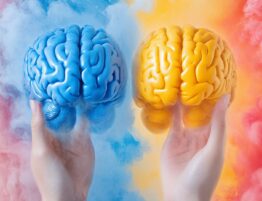In most cases, health depends on our lifestyle and habits. Some of them have a significant impact on the body and especially its main parts. These parts of the brain control our mental activity, cognitive functions, and ability to function. A harmful lifestyle hurts the functioning of the body as a whole. Alcohol is a factor that can cause many problems and harm the body. It has long been considered a depressant of the central nervous system. It slows down our functional work and does not allow us to live fully. It has a negative effect and contributes to the reduction of gray matter, which is necessary.
Many diseases arise due to the symptoms caused by this drink. It can severely disrupt neuroplasticity and neurogenesis. Constant use of this drink undermines good health and well-being. Our brain, which is key in many functions of the body, suffers the most. Over time, a person who consumes a large amount of this drink notices various disorders. Constant depressive state, anxiety, memory impairment, all this is caused by it.
How Alcohol Affects Brain Function and Cognition
Alcohol is a trigger for our system and has a harmful effect on the functioning of the body as a whole. Constant use of this substance causes memory impairment and poor decision-making. It changes the balance of neurotransmitters, which negatively affects our future life. The activity of organs changes, and information processing and functionality deteriorate. A small amount of blood with insufficient nutrients enters our system.
- The most affected are our cognitive functions and health. Damage to the nervous system occurs, which is a consequence of significant problems in the human body. The process of all functions slows down, so we lose normal health. Concentration is impaired. We cannot solve problems or make good, correct decisions. These are the short-term effects of alcohol consumption. Constant use of alcohol has much more significant consequences and causes a variety of diseases. As a result, we get damaged functions of our organs.
- A dangerous drink has a great impact on the hippocampus, which is responsible for learning memory. We get big problems with cognition, consciousness, and thinking in general. Often, people who consume a large amount of this drink later experience amnesia and poor condition in the body. Blood circulation is disrupted, which causes memory difficulties in the long and short term. The risk of neurodegenerative conditions, which can cause various diseases, increases. Alcohol can cause dementia and various syndromes that prevent normal living and thinking.
Alcohol’s Impact on Neurotransmitters and Brain Chemistry
Destructive substances negatively affect the neurotransmitter systems of our brain. There is a disruption of all functions that cause dire consequences in our body. There is a disruption of the subtle connection between various signals. This substance has a negative effect on the chemistry in our system and the increase of gamma-aminobutyric acid. This acid has a neutralizing and calming effect that helps us feel good. It reduces the nervous state, which is why we feel so good when we drink alcohol. This substance has a terrible effect on cognitive functions, motor skills, and General condition. Over time, a person loses the ability to live fully and notices disturbances in memory and health in general.
- The drink has a negative effect on glutamate, which is largely responsible for plasticity. Neural connections are disrupted, which in turn causes cognitive impairment. It becomes impossible to formulate or remember new memories and, in general, memories that matter to us. The liquid has a significant impact on neurology, which in turn becomes a reason for serious health concerns.
- Violation of neurotransmitters has an impact on other areas that are responsible for health. A person with regular use of the drink can notice various defects. Most often, they manifest in emotions, behavior, and imbalance of the body. Alcohol is a factor that leads to imbalance and worsens the ability to think.
- Long-term action is hazardous for neurochemical imbalance. There is a deterioration not only of overall health and cognitive functions. A person gets problems with neurological damage that subsequently causes diseases. In this case, it is only possible to do this with the help of doctors and the correct treatment plan.
Dependency and the Brain: Understanding Alcohol’s Addictive Nature
Long-term use of alcohol can cause several dangerous problems. They affect a person’s health, reduce memory, and worsen cognitive functions. There is a change in the natural chemical composition and an increase in unusual behavior. A person faces such a problem as a dependency. In turn, this condition is caused by the constant use of a harmful substance and requires specific treatment. The body becomes accustomed to alcohol’s sedative effects. In the long term, our brain needs a larger amount of this substance to get this effect. All actions are repeated over and over again during the use of the substance. A person receives a decrease in sensitivity to receptors, which causes great harm to the body.
- Such an addiction is hazardous and can lead to withdrawal symptoms. To begin with, a person feels anxiety, irritability, drowsiness, and excitement. Our neurological system suffers significantly from such an amount of alcohol. In the long term, a person may experience tremors, seizures, and hallucinations that lead to various diseases. Substance use is too dangerous for further action.
- Dependency does not come by itself and requires the intervention of doctors. A person wakes up every day with a desire to constantly drink and get these temporary euphoria. The mind is lost between the real world and the fictional and its atmosphere. This cycle leads to increased alcohol consumption. Alcohol initially acts as a sedative and quenches all the desires of a person. However, over time, a person notices this addiction, constant pain, and complications of various symptoms.
Neurological Damage from Chronic Alcohol Use
The neurology of a person suffers significant damage from the constant use of harmful substances. Alcohol has a negative effect on the functionality of the entire body. There is a decrease in gray matter and damage to the functions of the body. The brain undergoes irreversible changes, and its most essential parts suffer. The hippocampus and prefrontal cortex, which are responsible for impulses and decision-making, are greatly affected. Over time, cognitive abilities may deteriorate, which leads to the inability to live normally. A person becomes vulnerable, has memory problems, and cannot remember anything.
- It is better for a person to go through withdrawal for their health. And the ongoing alcohol consumption prevents them from fighting the problem and achieving success. Damage to neurons occurs due to the toxic effect of alcohol. It disrupts standard functionality and neuroplasticity, which, in turn, is very important.
- The most severe form of damage to our brain is Wernicke-Korsakoff syndrome. Alcohol causes a lack of vitamin B1, which is essential for this syndrome. Thiamine deficiency occurs, which in turn provokes memory loss and motor disorders.
- Neurology undergoes irreversible effects and significant losses. Mental disorders, depression, and anxiety occur. Constant use and habit of using harmful fluid is terrible. Damage occurs throughout the body, including its most essential parts. At first it passes in mild symptoms, over time a person can get serious diseases.
The Role of Alcohol Withdrawal in Brain Health
Withdrawal typically occurs when someone stops drinking alcohol after long-term use. Sudden withdrawal from liquid can negatively affect the human body. There is a violation of the neurochemical balance in the brain. In turn, a person can get either physical or mental disorders. Sudden withdrawal from liquid negatively affects the human body. It goes from a relaxed state to an excited and irritable state. Often, a person can observe various symptoms and damage to the body. Common withdrawal symptoms include confusion, seizures, and fever. Hallucinations or disorientation are usually possible during a sharp withdrawal from alcohol. Symptoms are an excellent indication that our body is trying to restore the balance lost before drinking liquid. To avoid a sharp withdrawal, the best option would be to seek medical help.
Preventing and Managing Neurological Damage from Alcohol Use
As a result of constant consumption of bad liquid, a person faces neurological damage. Long-term use becomes a trigger for the appearance of new diseases and symptoms. Reducing the amount of alcohol consumption has a positive effect on the function of the body and its principal organs. For everyone, health is the most essential thing, so taking care of it is mandatory. Liquid can damage cognitive functions and lead to a decrease in gray matter in the brain. Here are some examples of how to regain your health and not harm it:
- Detoxification will be an ideal option for improving health. The whole process takes place under the supervision of doctors and is a great help to control the appearance of withdrawal.
- Therapy and counseling play an essential role for people interested in their health. Doctors can examine the patient, help him with treatment, and prescribe a suitable method for each individual.
- Neurology is crucial to our well-being, so it must be protected. Nutritional support helps restore damaged body functions. It is better to eat food rich in group B and group D vitamins.
To get rid of dependency, the best option would be the intervention of doctors in your health. Working with medical professionals and support groups is the best way to recover.













Please, leave your review
Write a comment: